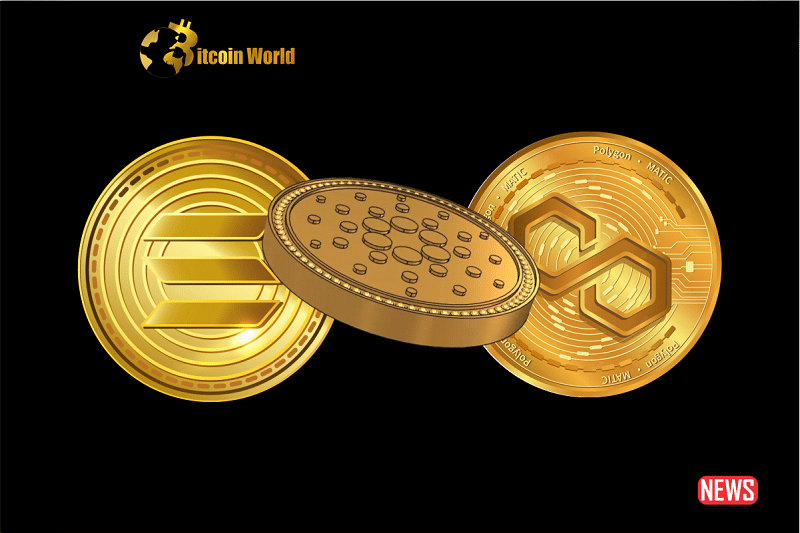The cryptocurrency world is buzzing! Imagine the SEC, the financial watchdog, suddenly pointing a finger at some of crypto’s biggest names – Solana (SOL), Polygon (MATIC), and Cardano (ADA). That’s precisely what happened when the SEC recently classified these popular tokens as securities in lawsuits against major exchanges like Binance and Coinbase. So, what’s the big deal, and what does this mean for your crypto portfolio?
Why the SEC’s Security Label is a Hot Topic
The core of the issue lies in the definition of a “security” under U.S. law. Essentially, if an asset is deemed a security, it falls under stricter regulatory oversight. This means more compliance requirements for exchanges listing these tokens and potentially more scrutiny for the projects themselves. Think of it like this:
- Securities are typically investments where you expect to profit from the efforts of others. Think stocks or bonds.
- Commodities, on the other hand, are raw materials or agricultural products.
- Cryptocurrencies have been navigating this blurry line, with the SEC now taking a firmer stance on certain tokens.
The SEC’s move has significant implications, considering the market cap of SOL, MATIC, and ADA combined is over $21 billion – a substantial chunk of the crypto pie!
The Crypto Heavyweights Push Back: How Are Solana, Polygon, and Cardano Responding?
Unsurprisingly, the organizations behind these cryptocurrencies aren’t taking the SEC’s classification lying down. Let’s break down their responses:
Cardano (ADA): “We’ve Never Been a Security”
Input Output Global (IOG), the team behind Cardano, issued a strong statement asserting that ADA has *never* been considered a security under U.S. law. They emphasized that the lawsuits won’t disrupt their operations and highlighted the critical need for clear regulations to protect both the industry and consumers. Their stance is firm: ADA’s purpose and functionality don’t align with the definition of a security.
Solana (SOL): Disagreement and a Call for Clarity
The Solana Foundation, based in Switzerland, expressed their disagreement with the SEC’s characterization of SOL as a security. While not explicitly denying the label, their focus is on collaborating with regulators and advocating for regulatory clarity within the digital asset space. They believe a clear framework is essential for fostering innovation and responsible growth.
Polygon (MATIC): Distancing from the US Market
Polygon Labs took a slightly different approach, emphasizing their global presence and development outside the U.S. They highlighted MATIC’s utility in securing the Polygon network, an Ethereum scaling solution, and pointed out that their actions haven’t specifically targeted the U.S. market. This suggests an attempt to mitigate the direct impact of U.S. regulations.
The Ripple Effect: What Happens Next?
The SEC’s actions have already had tangible consequences. Robinhood, a popular trading platform, announced the delisting of Solana, Polygon, and Cardano, citing the regulatory uncertainty caused by the lawsuits. This move underscores the immediate impact of regulatory scrutiny on token accessibility and market sentiment.
Navigating the Uncertainty: Challenges and Potential Solutions
The current situation presents several challenges for the crypto industry:
- Regulatory Uncertainty: The lack of clear rules creates confusion and hinders innovation.
- Market Volatility: News of regulatory actions often leads to price fluctuations.
- Limited Access: Delistings on major exchanges can restrict access for U.S. investors.
However, the crypto community is actively exploring solutions. One interesting example is the discussion around potentially forking Solana. Forking essentially creates a new version of the blockchain, which could be a way to adapt to regulatory requirements or address specific concerns.
Looking Ahead: The Quest for Clarity
The future for Solana, Polygon, and Cardano in the U.S. remains uncertain. The legal battles could be lengthy and complex. However, the commitment of the organizations behind these tokens to engage with regulators and advocate for clarity is a positive sign. Ultimately, finding a balance between protecting consumers and fostering innovation is crucial for the long-term health of the cryptocurrency ecosystem.
Key Takeaways:
- The SEC has classified Solana, Polygon, and Cardano as securities in lawsuits against Binance and Coinbase.
- The organizations behind these tokens strongly disagree with this classification.
- Regulatory uncertainty is impacting market access, as seen with Robinhood’s delisting.
- The crypto community is exploring solutions like forking to navigate the regulatory landscape.
- The push for regulatory clarity is paramount for the future of cryptocurrencies.
The ongoing discussions and legal proceedings will undoubtedly shape the future of these prominent cryptocurrencies and the broader regulatory landscape. Stay tuned as this story unfolds!
Disclaimer: The information provided is not trading advice, Bitcoinworld.co.in holds no liability for any investments made based on the information provided on this page. We strongly recommend independent research and/or consultation with a qualified professional before making any investment decisions.




